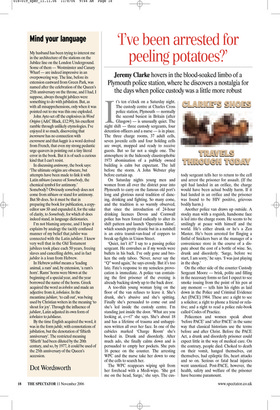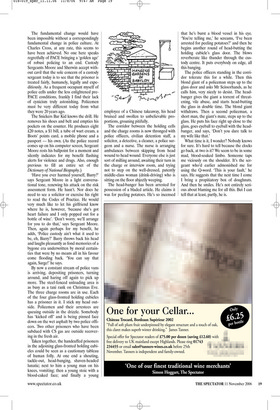‘I’ve been arrested for peeling potatoes?’
Jeremy Clarke hovers in the blood-soaked limbo of a Plymouth police station, where he discovers a nostalgia for the days when police custody was a little more robust It’s ten o’clock on a Saturday night. The custody centre at Charles Cross police station, Plymouth — normally the second busiest in Britain (after Glasgow) — is unusually quiet. The night shift — three custody sergeants, four detention officers and a nurse — is in place. The three charge rooms, 37 adult cells, seven juvenile cells and four holding cells are swept, mopped and ready to receive guests. But so far not a single one. The atmosphere in the hideously claustrophobic 1973 abomination of a publicly owned building is calm but expectant. The lull before the storm. A John Webster play before curtain up.
On Saturday nights young men and women from all over the district pour into Plymouth to carry on the famous old port’s long and glorious naval tradition of dancing, drinking and fighting. So many come, and the tradition is so warmly observed, that since the introduction of 24-hour drinking licences Devon and Cornwall police has been forced radically to alter its shift pattern and launch ‘Operation Talon’, which sounds pretty drastic but in a nutshell is an extra transit-van-load of coppers to break up fights in Union Street.
‘Quiet, isn’t it?’ I say to a passing police sergeant. He convulses as if my words were bullets in his back. I’ve only gone and broken the only taboo. ‘Never, never say the “Q” word again,’ he says crossly. But it’s too late. Fate’s response to my senseless provocation is immediate. A police van containing the first prisoner of the evening is already backing slowly up to the back door.
A too-thin young woman lying on the floor of the van refuses to leave it. She’s drunk, she’s abusive and she’s spitting. Finally she’s persuaded to come out and she’s led inside the custody centre. I’m standing just inside the door. ‘What are you looking at, c**t?’ she says. She’s about 18 and has a lifetime of trauma and unhappiness written all over her face. In one of the cubicles marked ‘Charge Room’ she’s booked in. Drunk and disorderly. After much ado, she finally calms down and is persuaded to empty her pockets. She puts 16 pence on the counter. The arresting WPC and the nurse take her down to one of the cells to search her.
The WPC reappears wiping spit from her forehead with a Medi-wipe. ‘She got me on the head, Sarge,’ she says. The cus tody sergeant tells her to return to the cell and arrest the prisoner for assault. (If the spit had landed in an orifice, the charge would have been actual bodily harm. If it had landed in an orifice and the prisoner was found to be HIV positive, grievous bodily harm.) Another police van draws up outside. A stocky man with a roguish, handsome face is led into the charge room. He seems to be smilingly at peace with himself and the world. He’s either drunk or he’s a Zen Master. He’s been arrested for flinging a fistful of Snickers bars at the manager of a convenience store in the course of a dispute about the cost of a bottle of wine. So, drunk and disorderly. ‘Sarge, before we start, I am sorry,’ he says. ‘I was just playing in the shop.’ On the other side of the counter Custody Sergeant Moore — brisk, polite and filling in the necessary forms so fast I expect to see smoke issuing from the point of his pen at any moment — tells him his rights as laid down in the Police and Criminal Evidence Act (PACE) 1984. These are: a right to see a solicitor; a right to phone a friend or relative; and a right to read a police rule-book called Codes of Practice.
Policemen and women speak about ‘before PACE’ and ‘after PACE’ in the same way that classical historians use the terms before and after Christ. Before the PACE Act, a drunk and disorderly prisoner could expect little in the way of medical care. On the contrary, people died. Choked to death on their vomit, hanged themselves, cut themselves, had epileptic fits, heart attacks and so on. Serious or fatal head injuries went unnoticed. Post-PACE, however, the health, safety and welfare of the prisoner have become paramount. The fundamental change would have been impossible without a correspondingly fundamental change in police culture. At Charles Cross, at any rate, this seems to have been achieved. No one here speaks regretfully of PACE bringing a ‘golden age’ of robust policing to an end. Custody Sergeants Moore and Sherwin accept without cavil that the sole concern of a custody sergeant today is to see that the prisoner is treated fairly, humanely, legally and expeditiously. As a frequent occupant myself of police cells under the less enlightened prePACE conditions, frankly I find their lack of cynicism truly astonishing. Policemen must be very different today from what they were 20 years ago.
The Snickers Bar Kid knows the drill. He removes his shoes and belt and empties his pockets on the counter. He produces eight £20 notes, a $1 bill, a tube of wart cream, a Boots’ points card, a mobile phone and a passport — his own. (As the police record comes up on his computer screen, Sergeant Moore rests his ballpoint for a moment and silently indicates for my benefit flashing alerts for violence and drugs. Also, enough previous to fill an entire set of the Dictionary of National Biography.) ‘Have you ever harmed yourself, Barry?’ says Sergeant Moore in a light conversational tone, renewing his attack on the risk assessment form. He hasn’t. Nor does he need to see a solicitor or exercise his right to read the Codes of Practice. He would very much like to let his girlfriend know where he is, however, ‘because she’s got heart failure and I only popped out for a bottle of wine’. ‘Don’t worry, we’ll arrange for you to do that,’ says Sergeant Moore. Then, again perhaps for my benefit, he adds, ‘Police custody ain’t what it used to be, eh, Barry?’ Barry throws back his head and laughs pleasantly as fond memories of a bygone era underwritten by moral certainties that were by no means all in his favour come flooding back. ‘You can say that again, Sarge!’ he says.
By now a constant stream of police vans is arriving, depositing prisoners, turning around, and haring off again to pick up more. The steel-fenced unloading area is as busy as a taxi rank on Christmas Eve. The three charge rooms are in use. Each of the four glass-fronted holding cubicles has a prisoner in it. I stick my head outside. Policemen and their arrestees are queuing outside in the drizzle. Somebody has ‘kicked off’ and is being pinned face down on the wet asphalt by two police officers. Two other prisoners who have been subdued with CS gas are outside recovering in the fresh air.
Taken together, the handcuffed prisoners in the adjoining glass-fronted holding cubicles could be seen as a cautionary tableau of human folly. At one end a shouting, tackle-out, head-banging, shaven-headed lunatic; next to him a young man on his knees, vomiting; then a young stoic with a blood-caked face; and finally a young employee of a Chinese takeaway, his head bruised and swollen to unbelievable proportions, groaning pitifully.
The corridor between the holding cells and the charge rooms is now thronged with police officers, civilian detention staff, a solicitor, a detective, a cleaner, a police surgeon and a nurse. The nurse is arranging ambulances between skipping from head wound to head wound. Everyone else is just sort of milling around, awaiting their turn in the charge or interview room, and trying not to step on the well-dressed, patently middle-class woman (drink-driving) who is sitting on the floor abjectly weeping.
The head-banger has been arrested for possession of a bladed article. He claims it was for peeling potatoes. He’s so incensed that he’s burst a blood vessel in his eye. ‘You’re telling me,’ he screams, ‘I’ve been arrested for peeling potatoes?’ and then he begins another round of head-butting the holding cubicle’s glass door. The blows reverberate like thunder through the custody centre. It puts everybody on edge, all this banging.
The police officers standing in the corridor tolerate this for a while. Then this blond giant of a policeman steps up to the glass door and asks Mr Scissorhands, as he calls him, very nicely to desist. The headbanger gives the giant a torrent of threatening, vile abuse, and starts head-butting the glass in double time. The blond giant withdraws. Then a second policeman, a short man, the giant’s mate, steps up to the glass. He puts his face right up close to the glass, goes eyeball to eyeball with the headbanger, and says, ‘Don’t you dare talk to my wife like that.’ What time is it, I wonder? Nobody knows for sure. It’s hard to tell because the clocks go back, at two is it? We seem to be in some mad, blood-soaked limbo. Someone taps me viciously on the shoulder. It’s the sergeant who’d earlier admonished me for using the Q-word. ‘This is your fault,’ he says. He suggests that the next time I come I bring a propitiatory box of doughnuts. And then he smiles. He’s not entirely serious about blaming me for all this. But I can tell that at least, partly, he is.



































































































 Previous page
Previous page